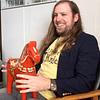Take a photo of a barcode or cover
adventurous
challenging
mysterious
reflective
medium-paced
Powerful and truly unique in scope and content. W charts new territory and goes far beyond what Russell thought he could do. This work places being and language into a unique perspective that I believe heavily draws from Buddhism. A classic
[dense and difficult, but mostly because W has not defined his terms. maybe it makes more sense (or signifies more carefully) in German?] here is an alternative & helpful way to read it [nested/telescoping text]: http://www.tractatuslogico-philosophicus.com/
The world is everything that is the case. I understood maybe 1/5th of this short treatise on language, logic, solipsism and philosophy. But even that was enough to make it on this top ten list. The 1/5th understanding is after reading it three times, by the way. He's a poetic philosopher, so what he is saying is either 100 percent or zero percent clear. I wanted to read this a few times before starting his other works, so I will begin those in 2011.
A very tightly wound argument based somewhat on Russell's Logical Atomism and the need for a perfect clarifying philosophical language to exorcise nonsense and claptrap out of philosophy. It was hoped that a lot of controversies in philosophy could be done away with a clean perfect logical language to represent the propositions of the world that would make the need for philosophy obsolete. This work was meant to be a ladder to be kicked away once it got one to where one was going. I read this book several times but this is the first time I got what Wittgenstein was trying to accomplish. His later philosophy in "philosophical investigations" realized the futility of the project as just another "language game" and had philosophy take a linguistic turn in the forties and fifties. God stuff. I guess stuff comes to me better later in life not as a callow undergraduate.
Update 11/24/2021 Tight logical structured worldview surrounded by a sea of mysticism
Update 11/24/2021 Tight logical structured worldview surrounded by a sea of mysticism
Re-reading the Tractatus confirms what I remember of it: Lots of impressive jewels among a sea of nonsense. You can see lots of principles of first and second-order logic, along with semantic networks in it, mixed with aphorisms that don't make much sense at all (at least to me).
I can feel it has ‘genius’ behind it but it’s so abstract I wonder if its worth the effort. Also it seems obviously nonsense. I mean the whole thesis that a perfect language would demarcate problems that can’t be solved from all that can and will be is pretty far out there. I got the gist from the intro. There are snippets which sound great but much of it I had no idea what he was talking about. Will have to come back to it later for another reading if inclined.
6.54 My propositions are elucidatory in this way: he who understands me finally recognizes them as senseless, when he has climbed out through them, on them, over them. (He must so to speak throw away the ladder, after he has climbed up on it.) He must surmount these propositions; then he sees the world rightly.
7 Whereof one cannot speak, thereof one must be silent.
7 Whereof one cannot speak, thereof one must be silent.
Wittgenstein suffered from being too far ahead of his time. Not because he lacked insight about the nature of language and using it to describe propositions, but because he did not have the tools of Gödel and Chomsky to actually recognize the stricter and more formal conclusions they later found.
slow-paced




